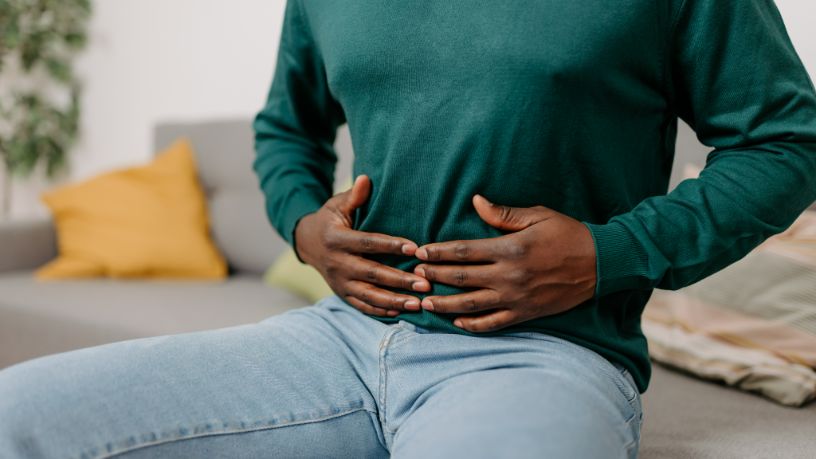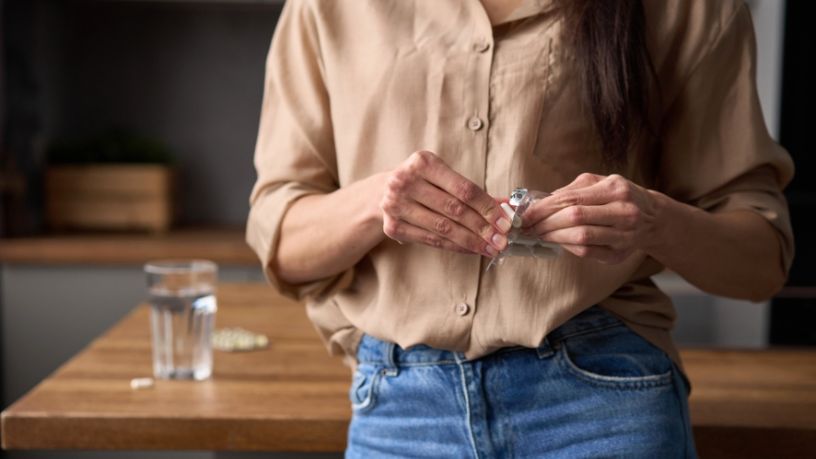Inflammatory bowel disease is a lifelong condition with no current cure.
On this page
Key takeaways
While serious, IBD can be well-managed with medications, diet and lifestyle changes.
A health team can support your journey and help reduce your risk of flare-ups
Around one in 250 Australians live with inflammatory bowel disease (IBD).1 The disease, which causes ongoing inflammation in a person’s gastrointestinal (GI) tract, is mostly made up of 2 conditions: Crohn’s disease and ulcerative colitis.
Here, we look at the basics of IBD, including its potential causes, symptoms and treatment options.
What is IBD?
According to Gastroenterologist Dr Paul Urquhart, IBD occurs when “different parts of the GI tract become inflamed, sometimes causing ulcers along the lining of the colon”.
While it can impact any part of the GI tract, Crohn’s disease commonly affects the small intestine.2 Ulcerative colitis, on the other hand, affects the inner lining of a person’s large intestine.3
The exact cause of IBD is not completely understood. However, certain factors are known to play a role in the development of the disease. According to Dr Urquhart, this involves the interaction between someone’s genetics, gut microbiome and immune system.
It’s thought that, with IBD, an overactive immune system attacks ‘good’ bacteria in your gut, mistaking them as harmful.4 “It’s this overactivity that contributes to the inflammation and damage affecting the GI tract in the bowel,” says Dr Urquhart.
Symptoms of IBD
IBD symptoms can vary from person to person and range from serious to mild. And the frequency and intensity of a flare-up will depend on whether you’re in remission or not.
The most common symptoms of IBD include:
- abdominal pain and cramps
- diarrhoea
- blood in your stool
- fatigue
- reduced appetite and weight loss.4
As a person with IBD may experience inflammation, blood loss and a decreased ability to absorb iron, vitamin B12 and folate, anaemia is another common IBD symptom.5
How is IBD diagnosed?
According to Dr Urquhart, a colonoscopy or endoscopy is “ultimately the best way to diagnose IBD”.
“But we will also do a series of tests, including a stool test and blood tests,” he adds.
Bowel imaging and scans may also be done to help determine the extent of the inflammation and complications.
Can IBD be cured?
While recent advancements are bringing scientists closer to understanding IBD, there is currently no cure for the disease.6 However, remission can often be achieved with medication, lifestyle changes and, for some people, surgery.
“IBD is a lifelong condition that can fluctuate based on whether it's under control or whether the patient has had a relapse,” says Dr Urquhart. “It needs to be monitored and treated for the long term.”
Can you avoid an IBD flare-up?
Living with IBD typically means living with flare-ups, however frequent or infrequent. But, while you may not be able to completely avoid flare-ups, avoiding certain ‘triggers’ may reduce your risk of them.
Common IBD triggers include:
- stress
- smoking
- missing medication
- non-steroidal anti-inflammatory drugs (NSAIDS)
- antibiotics
- infections.7
IBD and food
For many people, consuming certain foods and drinks is another IBD trigger. Dr Urquhart says that diet is a common concern for his IBD patients, but, unfortunately, there is no single diet that can control the condition.
“Most people with IBD are probably best served by having a healthy, balanced diet which is high in fruit, vegetables and fibre, rather than following a strict disease-specific diet,” he says.
That said, as IBD might cause an imbalance in your gut microbiome (which can lead to inflammation), incorporating parts of an anti-inflammatory diet may help restore it.8 This typically involves avoiding certain carbohydrates and consuming more pre and probiotic foods.9
Using parts of a low-FODMAP diet (which restricts things like garlic, onion and dairy) may also help manage symptoms relating to bowel sensitivity.10 But it’s important to be aware that this diet does not directly address inflammation.
What else can you do to manage your IBD?
“Finding a good team including a gastroenterologist, GP, dietitian and counsellor is very important,” says Dr Urquhart.
IBD might be a chronic disease without a specific cure, but it's one that can be managed very effectively.
If you notice changes in your bowel habits, or experience symptoms that don’t go away, it’s a good idea to speak to a healthcare professional.
“Be proactive and vigilant about your health,” Dr Urquhart adds, “not ignoring symptoms if they occur.”

Resources
Crohn’s & Colitis Australia works towards empowering people living with IBD. Visit their website for helpful resources and information, or call them on 1800 138 029

At Bupa, trust is everything
Our health and wellbeing information is regularly reviewed and maintained by a team of healthcare experts, to ensure its relevancy and accuracy. Everyone's health journey is unique and health outcomes vary from person to person.
This content is not a replacement for personalised and specific medical, healthcare, or other professional advice. If you have concerns about your health, see your doctor or other health professional.
1UNSW Microbiome Research Centre. (2023). Australian Inflammatory Bowel Disease Microbiome Study. UNSW Sydney.
2Crohn’s & Colitis Australia. (2022). About Crohn’s Disease. Crohn’s & Colitis Australia.
3Crohn’s & Colitis Australia. (2022). About Ulcerative Colitis. Crohn’s & Colitis Australia.
4Mayo Clinic. (2022). Inflammatory bowel disease (IBD). Mayo Clinic.
5Crohn’s & Colitis Australia. (2022). Anaemia in IBD. Crohn’s & Colitis Australia.
6Sample, I. (2024). Bowel disease breakthrough as researchers make ‘holy grail’ discovery. The Guardian.
7Crohn’s & Colitis Foundation. (2020). Causes of Flares. Crohn’s & Colitis Foundation.
8Shafiee, N. H., Manaf, Z. A., Mokhtar, N. M., & Raja Ali, R. A. (2021). Anti-inflammatory diet and inflammatory bowel disease: what clinicians and patients should know?. Intestinal Research, 19(2), 171-185.
9Olendzki, B. C., Silverstein, T. D., Persuitte, G. M., Ma, Y., Baldwin, K. R., & Cave, D. (2014). An anti-inflammatory diet as treatment for inflammatory bowel disease: a case series report. Nutrition Journal, 13, 5.
10Healthdirect. (2023). Low FODMAP diets. Healthdirect.
You might also like...
How the gut microbiome affects IBS and IBD
You gut contains trillions of microorganisms known as a 'microbiome’. Find out how yours may be affecting your IBS or IBD.
Bloated or full? Understanding your fluctuating stomach
Do you ever get a ‘food baby’ in your stomach and wonder where it came from? Learn the difference between being bloated and full.
Sick of being sick? Boost your gut health
If you often get sick, your gut might be telling you that something’s wrong. Learn more about boosting your gut health.
Do probiotic supplements help gut health?
Probiotic supplements claim to improve your gut health, but do they actually work? Find out if you should be taking them.





